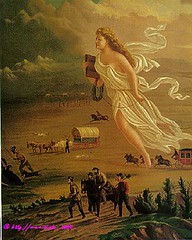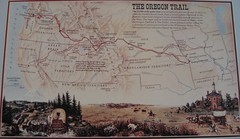| 8608438120 | Popular Sovereignty | The notion that the sovereign people of a given territory should decide whether to allow slavery. | 0 | |
| 8608438121 | Fugitive Slave Law | Passed as part of the Compromise of 1850, it set high penalties for anyone who aided escaped slaves and compelled all law enforcement officers to participate in retrieving runaways. | 1 | |
| 8608438122 | Uncle Tom's Cabin | Harriet Beecher Stowe's widely read novel that dramatized the horrors of slavery. | 2 | |
| 8608438129 | Sharecropping | An agricultural system that emerged after the Civil War in which black and white farmers rented land and residences from a plantation owner in exchange for giving him a certain "share" of each year's crop. | 3 | |
| 8608438131 | Compromise of 1850 | Admitted California as a free state, opened New Mexico and Utah to popular sovereignty, ended the slave trade (but not slavery itself) in Washington D.C., and introduced a more stringent fugitive slave law. Widely opposed in both the North and South, it did little to settle the escalating dispute over slavery. | 4 | |
| 8608438132 | Kansas-Nebraska Act | 1854. Proposed that the issue of slavery be decided by popular sovereignty in the Kansas and Nebraska territories, thus revoking the 1820 Missouri Compromise. Introduced by Stephen Douglass in an effort to bring Nebraska into the Union and pave the way for a northern transcontinental railroad. | 5 | |
| 8608438140 | Abolitionist Movement | The movement to end the practice of slavery within the entirety of the United States. | 6 | |
| 8608438142 | The American Party (The Know-Nothing Party) | (1840s-1850s) This political party carried anti-immigrant sentiments against the Catholic and the Irish and saw some electoral success. | 7 | |
| 8608438143 | Wilmot Proviso | (1846) Proposal to prohibit slavery in any land acquired in the Mexican War. Never passed by both houses of Congress but helped fan the flame of sectional tension. |  | 8 |
| 8608438144 | Free-Soil Party | (1848) Political party dedicated to stopping the expansion of slavery into new territories. |  | 9 |
| 8608438145 | Treaty of Guadalupe Hidalgo | (1848) The Mexican government gave up the area of Texas and offered to sell the provinces of California and New Mexico as a result of its defeat in the Mexican-American War. |  | 10 |
| 8608438146 | Gadsden Purchase | (1853) Agreement w/ Mexico that gave the US parts of present-day New Mexico & Arizona in exchange for $10 million; all but completed the continental expansion envisioned by those who believed in Manifest Destiny. |  | 11 |
| 8608438147 | Ostend Manifesto | (1854) A declaration issued from Ostend, Belgium, by the U.S. ministers to England, France, and Spain, stating that the U.S. would be justified in seizing Cuba if Spain did not sell it to the U.S. |  | 12 |
| 8608438148 | Bleeding Kansas | (1856-1861) A sequence of violent events involving abolitionists and pro-Slavery elements that took place in Kansas-Nebraska Territory. The dispute further strained the relations of the North and South, making civil war imminent. |  | 13 |
| 8608438149 | Dred Scott v. Sanford | (1857) Supreme Court case that decided US Congress did not have the power to prohibit slavery in federal territories and slaves, as private property, could not be taken away without due process. Invalidated the Missouri Compromise. |  | 14 |
| 8608438150 | John Brown's Raid on Harper's Ferry | (1859) John Brown led a raid on Harper's Ferry. He hoped to start a rebellion against slaveholders by arming enslaved African Americans. Brown was quickly defeated by citizens and federal troops. Brown became a villain to southerners who now thought northerners would use violence to end slavery as well as a martyr to some northerners who saw Brown as someone who sacrificed himself for the ideal of freedom for all. |  | 15 |
| 8608438151 | Election of 1860 | (1860) The United States presidential election of 1860 set the stage for the American Civil War. Hardly more than a month following Lincoln's victory came declarations of secession by South Carolina and other states, which were rejected as illegal by outgoing President James Buchanan and President-elect Lincoln. |  | 16 |
| 8608438157 | Manifest Destiny | A notion held by a nineteenth-century Americans that the United States was destined to rule the continent, from the Atlantic the Pacific. |  | 17 |
| 8608438158 | Louis O'Sullivan | Coined the term Manifest Destiny in a newspaper article. |  | 18 |
| 8608438159 | Texas Annexation | 1845. Originally refused in 1837, as the U.S. Government believed that the annexation would lead to war with Mexico. Texas remained a sovereign nation. Annexed via a joint resolution through Congress, supported by President-elect Polk, and approved in 1845. Land from the Republic of Texas later became parts of NM, CO, OK, KS, and WY. |  | 19 |
| 8608438160 | "Fifty-Four Forty or Fight" | The phrase used in James K Polk's 1844 presidential election dealing with the Oregon Territory. Polk's campaign used the phrase as a rallying cry for the United States to obtain all of Oregon Territory, including land claimed by the English, up through Northern Canada. |  | 20 |
| 8608438161 | Oregon Trail | 2000 mile long path along which thousands of Americans journeyed to the Willamette Valley in the 1840's. |  | 21 |
| 8608438162 | California Gold Rush | 1849. Gold discovered in California attracted a rush of people all over the country and world to San Francisco; arrival of the Chinese; increased pressure on federal government to establish a stable government |  | 22 |
| 8608438163 | Mexican American War | 1846 - 1848. President Polk declared war on Mexico over the dispute of land in Texas. At the end, American ended up with 55% of Mexico's land, called the Mexican Cession. |  | 23 |
| 8608438164 | Republican Party | 1854. Established by anti-slavery Whigs and Democrats, "free-soilers" and reformers from the Northwest met and formed party in order to keep slavery out of the territories. |  | 24 |
| 8608438168 | secession | Formal withdrawal of states or regions from a nation |  | 25 |
| 8608438170 | sectionalism | Term used to describe the growing differences between the regions of the United States, especially the North and South, leading up to the Civil War. |  | 26 |
| 8608438187 | James K. Polk | Democratic president after John Tyler who was best known for policies that promoted Manifest Destiny and expansionism. |  | 27 |
| 8608438188 | John C. Fremont | An American military officer, explorer, the first candidate of the Republican Party for the office of President of the United States (1856), and the first presidential candidate of a major party to run on a platform in opposition to slavery. |  | 28 |
| 8608438189 | Bear Flag Revolt | (1846) a revolt that took place during the Mexican-American War when 500 Americans (Anglos) in Mexican California took the city of Sonoma, CA in the spirit of Manifest Destiny and declared California to be an independent nation. |  | 29 |
| 8608438190 | Liberty Party | A former political party in the United States; formed in 1839 to oppose the practice of slavery; merged with the Free Soil Party in 1848. |  | 30 |
| 8608438191 | John C. Calhoun | Senator who argued for states' rights for the South. He asked for slavery to be left alone, slaves to be returned to the South, and state balance to be kept intact. |  | 31 |
| 8608438192 | William H. Seward | Congressman of the "Young Guard" who fiercely opposed slavery and argued that Americans should follow a "higher law" (God's law) over the Constitution when it came to the issue of slavery. |  | 32 |
| 8608438193 | Henry Clay | Known as the "Great Compromiser"; senator who pushed for compromise between the North and South and worked with Stephen Douglas; major figure in the passing of both the Missouri Compromise (1820) and Compromise of 1850. |  | 33 |
| 8608438194 | Underground Railroad | Secret system of safe houses along a route that led many slaves to freedom in the North and eventually Canada. |  | 34 |
| 8608438200 | Lincoln-Douglas Debates | Lincoln challenged Stephen Douglas to debates during the senatorial race of 1858 which became a public referendum on the issue of slavery. |  | 35 |
AP US History Period 5 part 1 Flashcards
Primary tabs
Need Help?
We hope your visit has been a productive one. If you're having any problems, or would like to give some feedback, we'd love to hear from you.
For general help, questions, and suggestions, try our dedicated support forums.
If you need to contact the Course-Notes.Org web experience team, please use our contact form.
Need Notes?
While we strive to provide the most comprehensive notes for as many high school textbooks as possible, there are certainly going to be some that we miss. Drop us a note and let us know which textbooks you need. Be sure to include which edition of the textbook you are using! If we see enough demand, we'll do whatever we can to get those notes up on the site for you!

